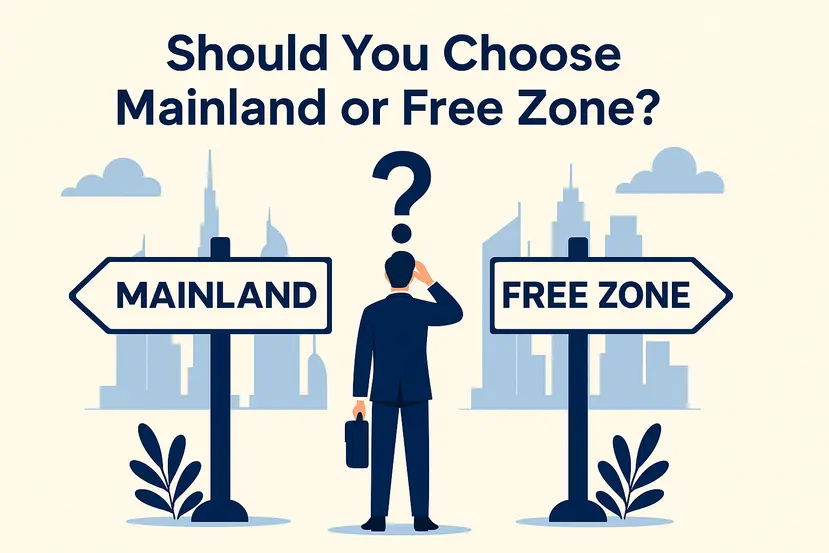Thinking about starting a business in Dubai? You’re not alone. Dubai has become one of the most attractive business hubs in the world, offering zero income tax, a strategic location, and world-class infrastructure. But before you dive in, it’s important to understand the process step-by-step to avoid costly mistakes.
This guide will walk you through how to launch a business in Dubai in 2025, especially if you’re doing it for the first time.
Why Dubai Is the Best Place to Start a Business in 2025
Dubai continues to attract entrepreneurs from every corner of the world and 2025 is shaping up to be its most business-friendly year yet. The city’s government actively promotes entrepreneurship through flexible company laws, simplified digital licensing, and zero personal income tax.
Here’s why Dubai stands out:
- Tax-free environment: 0% personal and capital-gains tax, and only 9% corporate tax above AED 375,000.
- Strategic location: Dubai connects Asia, Europe, and Africa, perfect for global trade and remote operations.
- Investor-friendly policies: 100% foreign ownership is allowed in most sectors, with no currency restrictions.
- Thriving startup ecosystem: Access to accelerators, venture capital, and innovation hubs like DIFC FinTech Hive and Dubai Internet City.
- World-class infrastructure: Seamless logistics, smart government services, and advanced digital platforms make setup fast and efficient.
Starting a business in Dubai in 2025 means joining a stable, innovation-driven economy designed for growth and Startup Works helps founders take advantage of every opportunity.
What Are the First Steps to Register a Business in Dubai?

1. Decide on the Type of Business Activity
Dubai offers many options, from tech startups to retail, consultancy, trading, logistics, and e-commerce. The activity you choose will determine which licenses and approvals you need.
Some activities (like financial services) are regulated more strictly than others.
Tip: Don’t generalize. Be specific like “management consultancy” instead of just “consulting.”
Should You Choose Mainland or Free Zone?

2. Select the Right Jurisdiction: Mainland, Free Zone, or Offshore
- Mainland businesses can trade across the UAE and work with government contracts.
- Free Zones offer 100% foreign ownership and tax benefits but restrict trading to outside the UAE or within the same zone.
- Offshore setups are ideal for international operations without a physical UAE presence.
Quick Tip: For e-commerce or remote work, free zones like Meydan or Shams may be ideal.
Mainland vs Free Zone vs Offshore, Which Is Right for You?
Choosing the right jurisdiction is one of the most important decisions when starting a business in Dubai. Each option comes with its own advantages, costs, and trade restrictions. Here’s a quick comparison to help you decide:
| Feature | Mainland | Free Zone | Offshore |
|---|---|---|---|
| Ownership | 100% foreign ownership (for most activities as of 2025) | 100% foreign ownership | 100% foreign ownership |
| Business Scope | Can trade across the UAE and bid for government contracts | Can trade within the same Free Zone or internationally | Only for international business (not allowed to trade within UAE) |
| Office Requirement | Must lease physical office space | Flexi-desk or virtual office allowed | No physical office required |
| Visa Eligibility | Eligible for investor and employee visas | Eligible for investor and employee visas (limited quota per package) | No visa eligibility |
| Corporate Tax | 9% on profits above AED 375,000 | Qualifying Free Zone companies may enjoy 0% tax | 0% UAE corporate tax (if income is from outside UAE) |
| Ideal For | Local trading, services, retail, government contracts | Startups, e-commerce, consulting, tech, and freelancers | Holding companies, international trading, asset protection |
Quick Tip:
If your business involves UAE clients or on-ground operations, a Mainland license is best.
If you plan to sell services online or operate internationally, a Free Zone license offers more flexibility and ownership benefits.
At Startup Works, we help founders choose the ideal jurisdiction based on their goals, activities, and target market, saving time and avoiding costly re-licensing later.
What License Do You Need?
3. Choose the Appropriate Business License
There are four main types of business licenses:
- Commercial (for trading businesses)
- Professional (for services or consultancies)
- Industrial (for manufacturing/production)
- Tourism (for travel-related businesses)
Extra Note: Some activities need special external approvals (e.g., health, education, financial services).
What Documents Are Required?
4. Prepare Your Documentation
Here’s what you usually need:
- Passport copies of all shareholders
- Visa copies or entry stamps
- Passport-sized photos
- NOC (No Objection Certificate) if you’re under a UAE sponsor
- Business plan (sometimes required for specific activities)
Pro Tip: Free zones often allow setup with scanned copies, you don’t need to be in the UAE physically.
How Do You Register the Company?
5. Submit Application and Get Initial Approval
Once documents are ready:
- Apply with the chosen authority (like DED for Mainland, or RAKEZ, DMCC, etc. for Free Zones)
- Reserve your trade name
- Get initial approval
- Finalize office space (required before final license issuance)
Free Zones usually offer shared desks or virtual offices for startups. Mainland businesses need to lease a physical office.
What Are the Fees and Setup Costs?
6. Understand the Costs Involved
Costs vary depending on:
- The jurisdiction (Free Zone vs. Mainland)
- License type
- Office space (virtual desk vs. physical office)
- Visa quota and employee count
For most startups:
- Free zone packages start at AED 5,750 (startup works offers from 4,999 AED )
- Mainland setup may range from AED 12,000–25,000+
Be sure to factor in hidden costs like:
- Corporate bank account setup
- UAE national sponsorship (for some Mainland businesses)
- Annual renewals
Cost & Timeline for Business Setup in Dubai (2025)
Understanding the costs and expected timeline helps you plan your budget and launch smoothly. Prices and processing times depend on your business type, license, and chosen jurisdiction.
| Category | Free Zone Setup | Mainland Setup |
|---|---|---|
| Starting Cost | From AED 4,999 – AED 7,500 (depending on zone and activity) | From AED 12,000 – AED 25,000+ |
| Ownership | 100% foreign ownership | 100% foreign ownership for most sectors |
| License Issuance Time | 2 – 5 working days | 5 – 10 working days |
| Visa Processing | Optional; usually 3–5 days per visa | Required; 5–7 days per visa |
| Office Options | Flexi-desk / Virtual office | Physical office lease required |
| Annual Renewal Fees | Approx. AED 5,000 – AED 10,000 | Approx. AED 10,000 – AED 20,000 |
Important Notes:
- Corporate bank account setup may add AED 1,000 – AED 3,000, depending on the bank.
- VAT registration is mandatory once annual turnover exceeds AED 375,000.
- Express packages in certain Free Zones (like Meydan and Shams) allow same-day licensing.
At Startup Works, we provide transparent business setup packages starting from AED 4,999, with no hidden costs, covering trade license, documentation, and government fees.
Can You Start the Process from Outside the UAE?
7. Yes, Remote Setup Is Possible
Most free zones and some mainland authorities allow full remote processing.
That means:
- No travel required
- Online submission of documents
- E-signatures for agreements
This is especially useful for freelancers or e-commerce business owners living abroad.
How Long Does It Take to launch a Business in Dubai?
8. Average Timeline
- Free Zone: 2–5 business days
- Mainland: 5–10 business days (depending on approvals)
Some zones even offer same-day license issuance under express packages.
What Comes After Company Registration?
9. Apply for Visas and Bank Account
After your company license is ready:
- Apply for investor/partner visas
- Open a UAE corporate bank account
- Register for VAT (if annual turnover is expected to exceed AED 375,000)
Banking Tip: Choose banks that understand startup needs. Emirates NBD, RAKBank, and Mashreq are startup-friendly.
Do You Need a Business Consultant?
10. Get Expert Help if You’re New
If you’re unfamiliar with UAE laws, regulations, or processes, working with a UAE Company Setup Consultant ( like Startup Works ) can save you time and costly mistakes.
They can:
- Recommend the right jurisdiction
- Handle documentation and submissions
- Guide visa processing and banking
- Give clarity on hidden costs and compliance
Mistakes to Avoid When Starting a Business in Dubai
Registering a business in Dubai can be simple, but small mistakes often lead to big delays or unexpected costs. Here are the most common ones to watch out for:
1. Choosing the wrong jurisdiction
Many entrepreneurs rush into a free zone or mainland setup without understanding the limitations. Always align your license type with your target market and operations.
2. Using a generic business activity
Vague license categories (like “consulting”) can cause rejections or future restrictions. Be specific, for example, “marketing consultancy” or “IT solutions provider.”
3. Ignoring visa and quota planning
Each license type has a fixed visa quota. Failing to plan for future employees can mean costly upgrades later.
4. Overlooking bank account requirements
Some banks require specific documentation, minimum balances, or in-person verification. Research your options early to avoid post-setup delays.
5. Missing hidden renewal costs
Many first-time founders budget only for license setup, not annual renewals, office rent, or mandatory health insurance.
6. Skipping professional help
Trying to handle approvals, PRO work, and compliance alone often leads to rejected applications or fines.
Working with an experienced UAE business setup consultant like Startup Works ensures accuracy, speed, and compliance at every step.
Can Foreigners Start a Business in Dubai?
Yes, foreigners can start and fully own a business in Dubai. Most Free Zones allow 100% foreign ownership, and as of 2025, many Mainland sectors also permit it. You don’t need a local partner for most activities, making Dubai one of the most accessible destinations for global entrepreneurs.
How Much Does It Cost to Register a Company in Dubai?
The cost of registering a company in Dubai varies based on location and activity type.
- Free Zone license: Starts from AED 4,999 – 7,500
( See our Freezone Company Formation Packages ) - Mainland license: Around AED 12,000 – 25,000+
Other potential costs include visa fees, office rent, and bank setup charges.
At Startup Works, we offer transparent packages with no hidden costs.
Do I Need to Live in Dubai to Own a Business Here?
No, you can set up and manage your UAE company remotely.
Free Zones like Meydan and Shams allow online registration, digital document signing, and e-approvals.
Once your business is registered, you can apply for an Investor Visa anytime if you decide to move or operate from Dubai later.
Frequently Asked Questions
Q1: Can I start a business in Dubai with no physical office?
Yes, especially in Free Zones where virtual desks are allowed.
Q2: Is 100% foreign ownership allowed?
Yes, in most Free Zones and many Mainland sectors (as of 2025).
Q3: Do I need a UAE national as a sponsor?
Not always. It’s optional for most business types in Free Zones and many in the Mainland.
Q4: What is the cheapest Free Zone in Dubai?
Options like Meydan and Shams offer affordable packages starting from AED 5,750.
Q5: Can I open a business bank account remotely?
Some banks allow remote onboarding, but many still require in-person verification.
Conclusion
Registering a business in Dubai is exciting, but only if done right. Whether you’re a first-time founder or expanding into the UAE, understanding each step can make or break your success.
Explore more: Ready to launch your company? Visit our Business Setup in Dubai page for a free consultation.


Leave a Reply